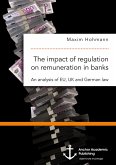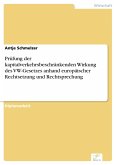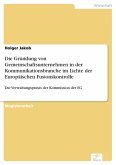Inhaltsangabe:Abstract: The aim of this dissertation is to analyse the potential clash of the principle of free establishment and the creditor protection principles in Germany. It researches the position of unsecured creditors of insolvent pseudo-foreign companies following the rulings of the European Court of Justice in Segers, Centros, Überseering and Inspire Art with the focus on German creditors of companies with limited liability incorporated in England and Wales. Research is carried out through reviewing and analysing academic and professional opinions voiced concerning the applicability, restricted or non-applicability of specific German creditor protection instruments following the ECJ rulings considering that the law of the country of incorporation governs foreign companies. European case law defining the current understanding of the fundamental freedom of establishment is reviewed and contrasted with subsequent rulings by German courts involving insolvent English companies. The result of the analysis shows that the number of English limited companies (Limited) is still relatively insignificant compared to the total number of German GmbH companies. Limiteds don't seem to replace the GmbH and don't yet present a threat to the German economy. Questionable is the accuracy and completeness of company information a German creditor can obtain. The main reason is the lack of a formalized or regulatory information process between the company registers of England and Germany. Based on the research performed it can be concluded that the principles of creditor protection in Germany differ greatly from those applied in England. The German creditors can no longer rely on the applicability of German creditor protection instruments and face legal uncertainties. In Germany the majority of creditor protection instruments are part of company law, in England they are part of insolvency laws. The European Insolvency Regulation is not specific enough to solve these uncertainties and can even aid forum shopping. Until further clarifications are provided by the ECJ through appropriate case law the situation will remain highly unsatisfactory for the German creditor. Inhaltsverzeichnis:Table of Contents: Introduction1 Literature Review12 Freedom of Establishment - Articles 43 and 48 EC12 German Creditor Protection and Articles 43 and 48 EC16 I.Duty to file insolvency proceedings21 II.Equity Capital Maintenance and Replacement25 III.Destroying a [...]
Dieser Download kann aus rechtlichen Gründen nur mit Rechnungsadresse in A, B, BG, CY, CZ, D, DK, EW, E, FIN, F, GR, HR, H, IRL, I, LT, L, LR, M, NL, PL, P, R, S, SLO, SK ausgeliefert werden.









